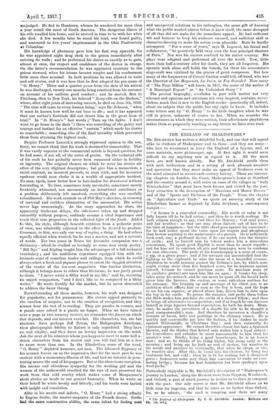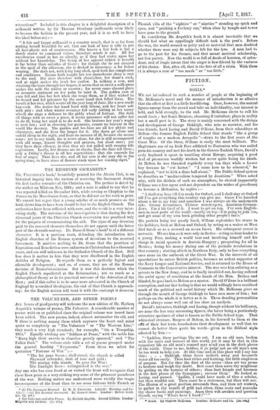THE ENGLAND OF SHAKESPEARE.• MR. Drrennerss has written a delightful
book, and one that will appeal alike to students of Shakespeare seal to those—and they are many— who love to reconstruct in fancy the England of a bygone, and, as some maintain, more picturesque, age. At first sight it would seem difficult to say anything new in regard to it. All the main facts Are well known already. But Mr. Ditchfield retells them with such enthusiasm and in a setting of such pleasant anecdote and quotation that they must make an appeal of freshness even to the mind saturated in seventeenth-century history. There are interest- ing chapters on London, the Court, Shakespeare's home at Stratford and the country around it, with notes on some of the villages in " leafy Warwickshire" that must have been known and visited by the poet. Very attractive is the description of " Mansions and Manor Houses " and of the " Sports and Pastimes of the People." From the chapter on " Agriculture and Trade " we quote an amusing study of the Elizabethan farmer as depicted by John Stephens, a contemporary essayist :-
" A farmer is a concealed commodity. His worth or value is not fully known till he be half rotten : and then he is worth nothing. He hath religion enough to say, Cod bless his Majesty ; God send peace, and fair weather : so that one may glean harvest out of him to be his time of happiness : but the tithe-sheaf goes against his conscience ; for he had rather spend the value upon his reapers and ploughman than bestow anything to the maintenance of a parson. He is sufficiently book-read, nay, a profound doctor, if he can search into the diseases of cattle and to foretell rain by tokens makes him a miraculous astronomer. To speak good English is more than he much regards ; and for him not to contemn all arts and languages, were to condemn his own education. The pride of his housekeeping is a mess of cream, a pig, or a green goose : and if his servants can uncontrolled find the highway to the cupboard, ho wins the name of a bountiful yeoman. Doubtless he would murmur against the Tribune's law, by which none might occupy more than five hundred acres, for he murmurs against himself, because he cannot purchase more. To purchase arms (if he emulates gentry) sets upon him like an ague : it breaks his sleep, takes away his stomach, and he can never be quiet till the herald hath given him the harrows, the cuckoo, or some ridiculous emblem for his armoury. The bringing up and marriage of his eldest son, is an ambition which afflicts him so soon as the boy is born, and the hope to see his son superior, or placed above him, thrives him to dote upon the boy in his cradle. To peruse the statutes, and prefer them before the Bible makes him purchase the credit of a shrewd fellow ; and then he brings all adversaries to composition ; and if at length he can discover himself in large legacies beyond expectation, he hath his desire. Mean- time, he makes the prevention of a dearth his title to be thought a good commonwealth's man. And therefore he preserves a chandler's treasure of bacon, links and puddings in the chimney corner. He is quickly and contentedly put into the fashion, if his clothes be made against Whitsuntide, or Christmas Day : and then outwardly ho contemns appearance. He cannot therefore choose but hate a Spaniard likewise, and (he thinks) that hatred only makes him a loyal subject : for benevolence and subsidies be more unseasonable to him than his quarter's rent. Briefly, being a good housekeeper, he is an honest man : and so, he thinks of no rising higher, but rising early in the morning ; and being up, he bath no end of motion, but wanders in his woods and pastures so continually, that when he sleeps, or sits, he wanders also. After this, he 'turns into his element, by being ton venturous hot, and cold : then he is fit for nothing but a chequered grave : howsoever some may think him convenient to make an ever- lasting bridge ; because his best foundation has been (perhaps) upon wool-packs."
Particularly enjoyable is Mr. Ditchficld's description of " Shakespeare's journey to London," along the Western route from Shipston, Woodstock, and Oxford, a part of which journey he invites us to share in company with the poet. Our only regret is that Mr. Ditchfield allows us so little time for lingering, and that he takes us no farther than Oxford, for, as he admits, " the road is tempting and there are many
The England of Shakespeare. By r. IL Ditchlleld. London : Methuen and
attractions." Included in this chapter is a delightful description of a milkmaid written by Sir Thomas Overbury (milkmaids seem likely to become the fashion in the present year, and it is as well to have the ideal before us) :—
" A fair and happy milkmaid is a country wench, that is so far from making herself beautiful by art, that one look of hers is able to put all face-physic out of countenance. She knows a fair look is but a dumb orator to commend virtue, therefore minds it not. All her excellencies stand in her so silently, as if they had stolen upon her without her knowledge. The lining of her apparel (which is herself) is far better than outsides of tissue : for though she be not arrayed in the spoil of the silkworm, she is decked in innocency, a far better wearing. She doth not, with lying long abed, spoil both her complexion and conditions. Nature hath taught her too immoderate sleep is rust to the soul. She rises therefore with chanticleer, her dame's cock, and at night makes the lamb her curfew. In milking a cow, and straining the teats through her fingers, it seems that so sweet a milk-press makes the milk the whiter or sweeter ; for never came almond glove or aromatic ointment on her palm to taint it. The golden ears of corn fall and kiss her feet when she reaps them, as if they wished to be bound and led prisoners by the same hand that felled them. Her breath is her own, which scents all the year long of June, like a new-made hay-cock. Sho makes her hand hard with labour, and her heart soft with pity : and when winter evenings fall early (sitting at her merry wheel) she sings a defiance to the giddy wheel of fortune. She doth all things with so sweet a grace, it seems ignorance will not suffer her to do ill, being her mind is to do well. She bestows her year's wages at next fair ; and in choosing her garments, counts no bravery in the world like decency. The garden and bee-hive are all her physic and chirurgery, and she lives the longer for it. She dares go alone and unfold sheep in the night, and fears no manner of ill, because she means none : yet to say truth, she is never alone, for she is still accompanied with old songs, honest thoughts and prayers, but short ones ; yet they have their efficacy, in that they are not palled with ensuing idle cogitations. Lastly, her dreams arc so chaste, that she dare tell them ; only a Friday's dream is all her superstition : that she conceals for fear of anger. Thus lives she, and all her care is she may die in the spring-time, to have stole of flowers stuck upon her winding-sheet."



























 Previous page
Previous page